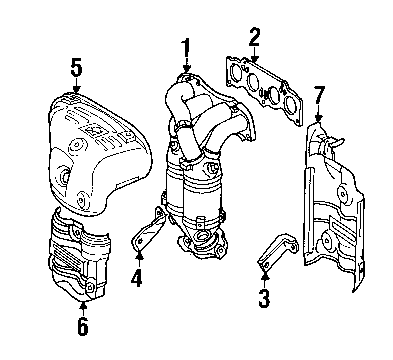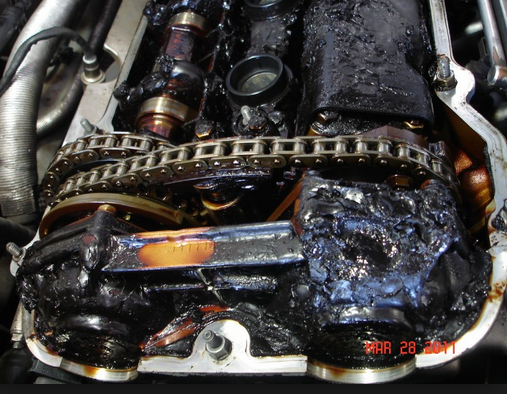Toyota Camry 1997-2001: Engine Noise Diagnostic Guide
Even Toyota Camry engines can be noisy after a hundred thousand miles. There may be a fix that you hadn't thought of though.
This article applies to the Toyota Camry (1997-2001).
The 5S-FE 4 cylinder in your Toyota Camry is ultra reliable and will last hundreds of thousands of miles, even with less than perfect maintenance. Like any engine though, certain things will cause it to make noise. Most causes are minor and can be remedied easily. Stick with us here and we will look at some of the most common causes of engine noise in your beloved Camry.
Since there is no way to know which of the following to check first, we will start with an easy one and go from there.

Materials Needed
- Mechanic's stethoscope
- Flathead screw driver
Step 1 – Check exhaust heat shield
If the noise you hear is a rattle, this could be it.
Heat shields on your exhaust are there to keep the heat away from you. They are normally made of sheet metal that is fairly thin. If they rust and come loose they will rattle, which is very irritating.
- With the engine running and the noise happening, take a screw driver and press on the heat shields on the engine. They are usually around the exhaust manifold.
- If you press on one and the rattle stops, you have found your rattle!
- Sometimes you can gently bend the shield and the noise will stop. If not, a hose clamp can be put around the manifold and clamp the shield to it.

Pro Tip
In extreme situations, you can take the shield off, but it is better to leave it on like the factory designed it.
Step 2 – Listen to exhaust manifold
The exhaust manifold can leak at a few places in the engine compartment.
The exhaust manifold is made of cast steel and the cylinder head is cast aluminum. The gasket where these two meet can sometimes start leaking. The noise will be a rhythmic pop pop that keeps following the engine. The gasket (number 2 in Figure 1 above) is easy to replace and cheap to buy.
Use a mechanic's stethoscope to be able to pinpoint where the noise is coming from exactly. It is cheap to buy at your local auto parts store and can be used to locate a noise anywhere.

Pro Tip
A leaky exhaust is not only annoying but it is also dangerous. Carbon monoxide is odorless yet deadly.
Step 3 – Check exhaust system near engine
While we are on exhaust leaks, there is another area of concern on your Camry.
Your car has a small section of flexible exhaust tubing just as the exhaust goes under the car.

The flex pipe can go bad and leak. It will make your car sound like a popcorn maker at best, an old tractor at the worst. The section of exhaust that the flex pipe is in includes a catalytic convertor. That is an expensive piece to replace and is hard to do so. Just the flex part can be replaced with a new repair piece. You could do it yourself, but an exhaust shop can do it much easier.
Step 4 – Pinpoint the noise
Narrowing down where the noise is coming from helps in the diagnosis.
Listen to your engine with the stethoscope to pinpoint where the noise is coming from. If the noise is a sawing type, listen to the timing belt cover. If it is tapping, listen on the valve cover and injectors.
- The noise under the timing cover is most likely a timing belt, tensioner, or less likely a water pump. Replacing the timing belt is a maintenance item on your Camry. Timing belt kits include a new timing belt, tensioner, idler pulley, water pump, and gaskets. Once you decide to replace the belt, it only makes sense to also replace the other parts since you're already touching them anyway.
- Tapping noises are probably coming from the cam followers or fuel injectors. Your car has solid lifters rather than hydraulics and they can become noisy. Toyota says that some noise from them is normal and usually no adjustment is required. The valve cover has to come off to check them. It is not super difficult to check them but unless you understand the inner timing that goes on inside an engine, you may want to have it done professionally.
- If the tapping is rapid and not very loud, it is coming from your fuel injectors. They are at the top of the engine and close to the valve cover. It is natural for them to click when they open and close. Nothing to worry about here unless one is just too loud. Try using some good quality fuel injector cleaner.
- Rarely occuring noise, the alternator could be making a grinding noise, though Toyota electronics are very robust. If it is making noise like rocks in a can, it needs replaced.

Pro Tip
Toyota issued a bulletin for this engine that says it is important to change the oil and filter to keep sludge from forming in the engine. If your oil has not been changed regularly, this could have happened to your car. Sludge reduces the lubrication in the engine and causes serious issues.
Step 5 – Listen to the engine block
The 5S-FE engine is very tough, so if you hear banging in the block, it is not good.
A knocking sound from deep inside the engine is just bad. Bearing knock would keep in time with the speed of the engine.
-
A rod bearing knock can be diagnosed by removing the spark plug wire to the cylinders. As the spark is kept from occurring, the pressure on the rod bearings is lessened and the noise will get lighter.
- A main bearing knock is just flat bad news as there is nothing to do but repair or replace the engine.
If the inside of your engine looks like Figure 5, you can start thinking of ways to save money for an expensive repair.

Pro Tip
You may not want to try removing the plug wires while the engine is running if you are not equipped to do it, as the voltage from that spark will hurt you.
It is uncommon for a fuel injected engine to have a carbon build up on the pistons, but if it did happen, you will get a knock that is a lot like a bad rod bearing.
Any other noise coming from your engine would not be the norm, so it would be time to ask a pro. Good luck.
Related Discussions
- Engine Noise - Camryforums.com
- Sudden Loud Rattling Knocking Engine - Camryforums.com
- Knocking Sound Engine - Camryforums.com
- Camry Sounds like Tank - Camryforums.com
- Camry Hissing Noise Engine Comparment - Camryforums.com
- Timing Belt Noisy Valves - Camryforums.com






